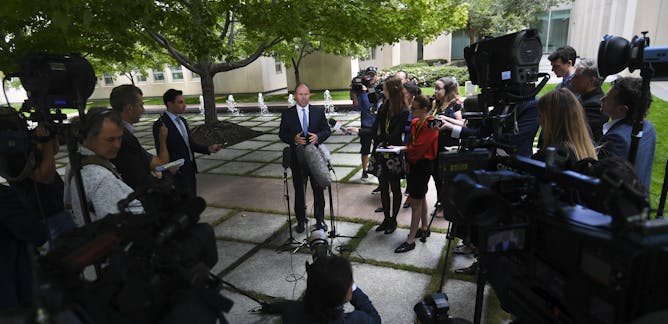|
What’s your news routine? As a subscriber, we know The Conversation Canada newsletter is one way you get your news. But where else do you go for news? Some of you may still enjoy the tactile experience of a printed newspapers. Perhaps cable TV news is your main source. More than likely, most of you get some of your news via Facebook or another social media feed.
A recent study by the Social Media Lab at Ryerson University showed that Facebook is the most widely used social media platform in Canada – 83 per cent of online Canadian adults reported having a Facebook account in 2020. While Facebook produces no original journalism, many people view the platform as a news source. And this leads us to an interesting battle taking place on the other side of the world. Facebook has taken an extreme step in reaction to an Australian law that would force tech giants like Google and Facebook to pay media companies for use of their content. Facebook decided this week that instead of paying, it would block all news
content in Australia.
That decision has had a direct impact on The Conversation Canada and all members of the global network of The Conversation. The Conversation concept started in Australia a decade ago. All editions operate under the same internet domain – theconversation.com, although each publication has its own country designation (ours are www.theconversation.com/ca and www.theconversation.com/ca-fr). Because the main domain is registered in Australia, we have been blocked from posting our stories on Facebook. From a readership perspective, this is not a major issue for us – Facebook views represent only about five per cent of our monthly audience. But these developments have served as a disturbing reminder of the power of Facebook, Google and other tech companies. While this is happening now in Australia, it’s only a matter of time before it comes to Canada – the Trudeau government has indicated it intends to bring in a law similar to Australia’s that will force Facebook to pay for news. That could mean
all Canadian media outlets will also be shut out of Facebook.
For your weekend reading pleasure, I’ve rounded up a few stories about the Facebook issue – as well as some of my favourite tech stories published across the global network of The Conversation. And a reminder that you can listen to the latest episodes of our new podcasts, Don’t Call Me Resilient and The Conversation Weekly.
Have a great weekend and we’ll be back in your Inbox on Monday.
|
Facebook vs. the Media
|

Diana Bossio, Swinburne University of Technology
Facebook pulling the plug on Australian news will cause short-term disruption, but readers and media will recover.
| |

David Tuffley, Griffith University
If you're fed up with Facebook, there are many options to step away, from taking a deactivation break, to a digital spring clean of how the platform accesses your data, to a full divorce.
|

Stephen King, Monash University
What made Facebook grow big wasn't what its targets would have been without it, it was what they were able to do with it.
| |

Fan Yang, Deakin University; Robbie Fordyce, Monash University
In China, a lot of news happens entirely inside the WeChat platform. Is this the future for Facebook?
|

James Meese, RMIT University
The timing of Google's deals raises questions, coming just as the News Media Bargaining Code is set to be introduced into federal parliament.
| |

Cassandra Preece, McMaster University; Helen Beny, McMaster University
Internet shutdowns and social media bans in Myanmar have helped the military retain control after the Feb. 1 coup. Here's why ISPs should develop clear policies around forced internet shutdowns.
|

Catherine Rosenberg, University of Waterloo; Andrew Lappalainen, University of Waterloo
It's time to create a special remote status for communities that struggle with connectivity challenges and lack access to high-speed internet.
| |

Lenore Newman, University of The Fraser Valley; Evan Fraser, University of Guelph
Year round local food production is within our grasp, and will slash agriculture's climate impact — but only if we embrace agricultural technology.
|
|
|

COVID-19 has highlighted longstanding racial inequalities in the education system. Educators say there is a way forward and out of this.
(Leonardo Burgos/Unsplash)
Vinita Srivastava, The Conversation
Carl James and Kulsoom Anwer discuss the injustices and inequalities in the Canadian education system.
|

The race to make enough coronavirus vaccines is underway.
i_am_zews via Shutterstock
Gemma Ware, The Conversation; Daniel Merino, The Conversation
A transcript of The Conversation Weekly podcast episode #3.
|